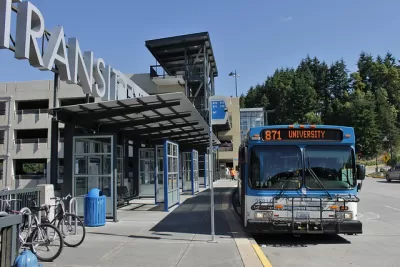The new "Solving the Climate Crisis" report could provide guidance and direction if federal leadership in Washington, D.C. finally decides to take aggressive steps to reduce carbon emissions and adapt to a changed climate.

The House Select Committee on the Climate Crisis released a new "Solving the Climate Crisis" report this week, calling specific attention to the ability of local planners to work for climate solutions, according to an article by APA Policy Director Jason Jordan.
"Over its more than 500 pages 'Solving the Climate Crisis' outlines big goals, economy-wide net zero carbon emissions by 2050, big aspirations, a new national commitment to a 'moonshot' approach to climate change, and granular policy detail covering a wide range of topics," according to Jordan.
"The recommendations are built around 12 'key pillars' with detailed legislative suggestions in each area. The pillars cover infrastructure, clean energy, zero-emission technology, workforce issues, environmental justice, public health, agriculture, resiliency, natural resources, national security and international leadership, and core institutions."
While the report has virtually nop hope of becoming law, according to Jordan, the report could influence climate legislation under a new administration in the Executive Branch or new leadership in Congress. The report also lays out specific steps for local planners to lead on climate action, and calls for a stronger federal role in supporting the work of planning on issues like "building codes, setting resiliency standards, overhauling flood mapping, providing better data to communities, funding mitigation, and bolstering local community engagement," according to Jordan. The call for a stronger role for planning expertise echoes similar sentiments in a recent article about the role of the planning profession during the pandemic.
FULL STORY: Congress Looks to Planning as a Climate Crisis Solution

Planetizen Federal Action Tracker
A weekly monitor of how Trump’s orders and actions are impacting planners and planning in America.

Congressman Proposes Bill to Rename DC Metro “Trump Train”
The Make Autorail Great Again Act would withhold federal funding to the system until the Washington Metropolitan Area Transit Authority (WMATA), rebrands as the Washington Metropolitan Authority for Greater Access (WMAGA).

The Simple Legislative Tool Transforming Vacant Downtowns
In California, Michigan and Georgia, an easy win is bringing dollars — and delight — back to city centers.

The Small South Asian Republic Going all in on EVs
Thanks to one simple policy change less than five years ago, 65% of new cars in this Himalayan country are now electric.

DC Backpedals on Bike Lane Protection, Swaps Barriers for Paint
Citing aesthetic concerns, the city is removing the concrete barriers and flexposts that once separated Arizona Avenue cyclists from motor vehicles.

In These Cities, Most New Housing is Under 441 Square Feet
With loosened restrictions on “micro-housing,” tiny units now make up as much as 66% of newly constructed housing.
Urban Design for Planners 1: Software Tools
This six-course series explores essential urban design concepts using open source software and equips planners with the tools they need to participate fully in the urban design process.
Planning for Universal Design
Learn the tools for implementing Universal Design in planning regulations.
Smith Gee Studio
City of Charlotte
City of Camden Redevelopment Agency
City of Astoria
Transportation Research & Education Center (TREC) at Portland State University
US High Speed Rail Association
City of Camden Redevelopment Agency
Municipality of Princeton (NJ)





























